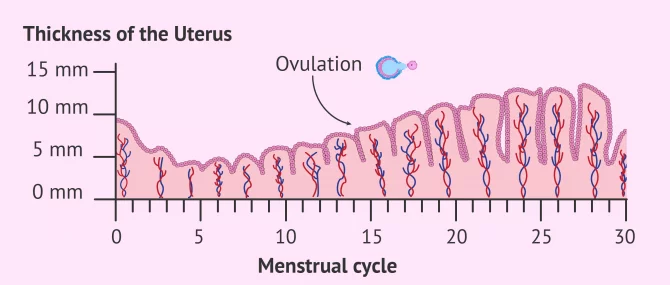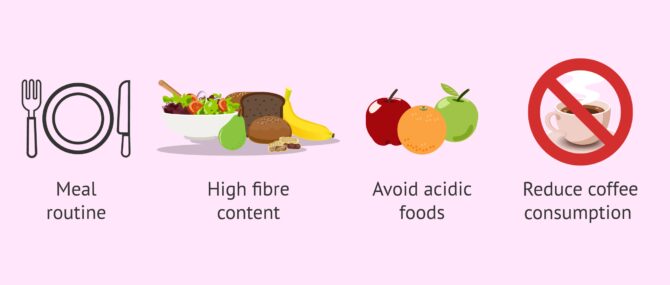The endometrium, uterine lining or endometrial lining is the inner layer of the womb, where embryo implantation takes place and the gestational sac develops, marking the beginning of a new pregnancy.
For this to be possible, it is necessary for the endometrium to be receptive. In other words, it should be in optimal quality conditions to favor the implantation of the embryo.
If not achieved naturally, increasing endometrial thickness is possible using hormonal drugs, as in the case of IVF patients. In any case, all women should take the following tips in order to improve endometrial thickness and quality before getting pregnant.
Provided below is an index with the 6 points we are going to expand on in this article.
- 1.
- 1.1.
- 2.
- 2.1.
- 2.2.
- 2.3.
- 2.4.
- 2.5.
- 2.6.
- 3.
- 3.1.
- 3.2.
- 3.3.
- 3.4.
- 3.5.
- 3.6.
- 3.7.
- 3.8.
- 3.9.
- 3.10.
- 4.
- 5.
- 6.
Understanding the endometrium
By endometrium or uterine lining we refer to a mucus membrane that lines the the inside of the womb in females. Endometrial thickness keeps on increasing throughout the menstrual cycle. If no embryo implantation occurs, it sheds in the form of menstrual flow.
So, in short, endometrial thickness varies depending on each different phase of the menstrual cycle.
When sperm meets egg and fertilization occurs in the Fallopian tube, the resulting embryo will start its journey toward the uterus and attach to the uterine lining.
For embryo implantation to be possible, endometrial thickness should be about 7 to 10 mm. Broadly speaking, this occurs naturally around days 19-21 of the cycle, considered the receptive phase of the endometrium or implantation window.
Related story: Sperm’s Journey to the Egg – How Sperm Meets Egg with Pictures.
What is a thick endometrium?
As explained above, the endometrium is considered to be receptive when it reaches the optimal thickness during the secretory phase of the menstrual cycle. Moreover, if observed through ultrasound scan, we would be able to see a triple line appearance.
The female sex hormones released from the ovary are responsible for increasing endometrial thickness and causing it to acquire a triple line appearance. All these characteristics are necessary for embryo implantation.
Furthermore, embryo-endometrial developmental synchrony is another factor contributing to increasing the chances of success. This synchrony occurs thanks to the effects of cytokines and other growth factors that favor embryo implantation.
To learn more, click here: What’s the Role of the Endometrium? – Function & Thickness.
Tips to improve endometrial thickness
Both naturally and in cases of women undergoing fertility treatment, endometrial thickness is a crucial factor for embryo implantation to be possible.
In the case of Assisted Reproductive Technology (ART), fertility specialists can be involved in the process of fertilization if the technique used is ICSI. However, whatever the technique used, embryo implantation is something that has to occur naturally.
Administering hormones like progesterone can help improve endometrial quality for implantation, both in the case of IVF patients and those who are trying to get pregnant.
If you need to undergo IVF to become a mother, we recommend that you generate your Fertility Report now. In 3 simple steps, it will show you a list of clinics that fit your preferences and meet our strict quality criteria. Moreover, you will receive a report via email with useful tips to visit a fertility clinic for the first time.
Women who face issues trying to conceive, or those with too think uterine linings, can improve endometrial thickness naturally by following these useful tips:
Foods to eat
A balanced diet can help women increase endometrial receptivity thanks to the action of estrogen, balanced hormones, and blood flow.
The following are some recommendations and foods that can help prepare your uterine lining:
- Spread your meals evenly throughout the day to balance your insulin and cortisol levels, which have a direct effect on reproductive hormones.
- Follow a fiber-rich diet, with a low glycemic index.
- Coenzyme Q10, or CoQ10, is a highly recommendable compound. This antioxidant can help reduce oxidative stress in the tissues, which has great benefits for the endometrium.
- Other foods that are rich in antioxidants and vitamins C and E are tomatoes, spinach, dried fruit...
- Foods containing B-group vitamins contribute to improve the blood flow, including eggs, carrots, spinach, dates, fish, Goji berries...
- Avoid sour foods during your period, including yogurts, grapefruits, and green apples.
- Reduce or give up coffee and other caffeine drinks.
If necessary, your doctor may prescribe certain medications or food supplements that contain these vitamins in order to improve endometrial thickness.
Rest
Sleeping has a direct effect on reproductive hormones and causes them to be properly balanced. Getting enough sleep can improve endometrial thickness.
You need at least 7 hours of sleep a day to allow your body to recover and promote the optimal growth of tissue.
To keep healthy sleep habits, you should go to bed and wake up at the same time daily, even on weekends.
Doing exercise
Exercise is recommended to improve endometrial thickness because it improves blood circulation and increases the blood supply to the womb.
At least 30 minutes per day, adjusting your exercise sessions in order not to feel exhausted after a session, are enough. Moderate physical activity like yoga, pilates, walking, swimming, or cycling are good examples.
Moreover, physical activity can help relax your body and diminish the stress levels, which can have a negative effect on endometrial quality.
Femoral massage
It involves applying pressure with the fingers over the femoral artery for a few seconds. It is recommended from the end of menstruation until ovulation.
Repeat it 2 or 3 times on each leg. It can be performed 1 or 2 times a day. Femoral massages allow you to increase the blood supply to the organs located in the pelvis, particularly the uterus and ovaries.
This technique, however, should not be done after an IVF embryo transfer or in case you haver high blood pressure.
Acupuncture
Several studies have claimed the many benefits of acupuncture on female fertility, as it increases the blood flow to the reproductive organs.
Chinese medicinal herbs are also useful to increase the blood supply to the uterus and ovaries.
Castor oil packs
This type of vegetable oil is rich in ricinoleic acid, which improves blood flow and promotes the elimination and healing of tissues and organs underneath the skin, in this case the ovaries and womb.
It can be applied by soaking a small piece of flannel or cotton in castor oil and placing it on the skin, above the pubic hair line. It should be done during the follicular phase of the menstrual cycle, that is, between 3 and 12 days after your last menstrual period.
One should note that these natural remedies can help increase endometrial thickness and quality in some cases. Unfortunately, in the most serious cases of infertility, or when there exist severe uterine disorders, the most appropriate is to follow a medical treatment that allows you to achieve the required endometrial thickness for implantation.
FAQs from users
Can endometrial thickness be improved wit natural remedies?
Endometrial thickness grows naturally in the middle of the cycle in women who have regular cycles . Drugs and supplements with anti-inflammatory effects should be avoided to avoid interfering with normal endometrial growth.
Abundant hydration and daily physical exercise, along with a varied diet and a healthy lifestyle, will promote the natural growth of the endometrium. In patients without periods (menopause) or patients with very irregular menstrual cycles, it will be necessary to administer drugs to help the endometrium grow.
Can you use vaginal viagra as a treatment to increase uterine lining?
Viagra works by dilating the blood vessels to increase the blood supply to the penis. Some studies have suggested that viagra can also be used as a vasodilator to increase blood flow to the uterus and improve endometrial thickness.
Even though it is rather uncommon, some specialists prescribe vaginal pessaries with viagra as an active ingredient with the purpose of increasing endometrial thickness.
What is the optimal size of the endometrium for pregnancy to occur?
Optimal endometrial size is assessed by measuring endometrial thickness, which is the most commonly evaluated parameter. The imaging method of choice is transvaginal ultrasound.
The optimal endometrium prior to embryo transfer is the so-called trilaminar, triple line or "coffee bean" endometrium, typical of the advanced follicular phase. It is formed by two outer hyperechogenic lines that represent the junction between the basal endometrium and the myometrium; two hypoechoic bands that are the functional layer of the endometrium; and, finally, a central hyperechogenic line, the lumen of the cavity.
The literature suggests that the normal range of endometrial thickness would be 6 mm at the lower limit and 20 mm at the upper limit. Implantation is unlikely outside these ranges. A thickness between 7 and 9 mm at periovulatory time is considered ideal in the literature; however, reasonable pregnancy rates are also achieved with endometrial thicknesses of 6 mm.
How can you thicken an endometrial lining that is too thin?
If the lining of the uterus is too thin (<6 mm), achieving a pregnancy will be considerably difficult for you, and homeopathy won't be enough to improve this situation. In these cases, your OB/GYN will prescribe hormonal drugs containing estrogen and progesterone to increase endometrial thickness, like Progynova.
Does the endometrium continue to grow after Ovitrelle administration?
The endometrium will continue to grow due to oestrogen after administration of Ovitrelle and also after ovulation/puncture. However, it should be noted that most studies assessing endometrial thickness are performed before the administration of Ovitrelle, so the valid measurement will be the one we can compare with existing studies.
Read more
What causes the lining of your uterus to thicken?
Estrogen is the hormone that causes the lining of the uterus to thicken and prepare the uterus for pregnancy. If pregnancy does not occur, estrogen and progesterone levels decrease, causing the endometrial lining to shed in the form of menstrual flow.
Is it advisable to do the embryo transfer with an endometrial thickness of 6 mm?
When the endometrium is less than 7 mm thick, fewer pregnancies may occur and the risk of miscarriage increases. However, this does not mean that it is not possible, as pregnancies have been achieved with endometrial thicknesses of up to 4 mm.
Read more
What does it mean when the lining of the uterus is too thick?
Endometrial hyperplasia is a condition in which the uterine lining becomes too thick. Having too much of the hormone estrogen without the hormone progesterone is one of the main causes of endometrial hyperplasia.
Some of the most common symptoms of a too thick endometrial lining include: irregular or frequent periods, bleeding between cycles, heavy bleeding (dysmenorrhea), pain during intercourse (dyspaurenia), cramping, bloating in the pelvic region, etc. Visit your OB/GYN if you think you may have this condition.
Can aspirin thicken uterine lining?
In some cases, a low dose of aspiring has been proven to help achieve higher pregnancy rates in women with mild fertility issues who are receiving fertility treatment. However, aspirin therapy cannot significantly increase the thickness of the endometrium.
Are there natural remedies to improve endometrial thickness?
The endometrium grows naturally during each menstrual cycle until it is shed at the end of the menstrual period if pregnancy does not occur.
However, in fertility treatments such as in vitro fertilisation (IVF), its growth is assessed to schedule the best time for embryo transfer.
There are no miracle remedies to improve endometrial thickness, but good hydration, moderate exercise (yoga, swimming, pilates, etc.) and eating regularly can help to improve endometrial thickness.
Suggested for you
Having a healthy lining of the uterus is crucial for embryo implantation in the womb. If you found this interesting, why don't check out the following post? What Is Embryo Implantation? - Process & Stages.
In the case of women undergoing IVF treatment, endometrial thickness plays a major role to achieve success after embryo transfer. Want to learn more? Read this next: IVF Embryo Transfer Procedure – Definition, Process & Tips.
We make a great effort to provide you with the highest quality information.
🙏 Please share this article if you liked it. 💜💜 You help us continue!
References
H F Ding, L Tian. [Relationship between endometrial thickness and pregnancy outcomes based on frozen-thawed embryo transfer cycles]. Zhonghua Fu Chan Ke Za Zhi. 2018 Nov 25;53(11):742-748. doi: 10.3760/cma.j.issn.0529-567x.2018.11.003.
Maryam Eftekhar, Nosrat Neghab, Elham Naghshineh, Parisa Khani. Can autologous platelet rich plasma expand endometrial thickness and improve pregnancy rate during frozen-thawed embryo transfer cycle? A randomized clinical trial. Taiwan J Obstet Gynecol. 2018 Dec;57(6):810-813. doi: 10.1016/j.tjog.2018.10.007 (View)
Rawad Bassil, Robert Casper, Nivin Samara, Tzu-Bou Hsieh, Eran Barzilay, Raoul Orvieto, Jigal Haas. Does the endometrial receptivity array really provide personalized embryo transfer? J Assist Reprod Genet. 2018 Jul;35(7):1301-1305. doi: 10.1007/s10815-018-1190-9. Epub 2018 May 8 (View)
Tao Zhang , Zhou Li, Xinling Ren, Bo Huang, Guijin Zhu, Wei Yang, Lei Jin. Endometrial thickness as a predictor of the reproductive outcomes in fresh and frozen embryo transfer cycles: A retrospective cohort study of 1512 IVF cycles with morphologically good-quality blastocyst. Medicine (Baltimore). 2018 Jan;97(4):e9689. doi: 10.1097/MD.0000000000009689 (View)
Wen-Juan Liu, Ying-Qi Nong, Jian-Xing Ruan, Ye Chen, Lin Fan, Qian-Wen Huang, Feng-Hua Liu. Impact of endometrial thickness during menstruation and endometrial scratching on the pregnancy in frozen-thawed embryo transfer. J Obstet Gynaecol Res. 2019 Mar;45(3):619-625. doi: 10.1111/jog.13872. Epub 2018 Dec 4 (View)
Zaher Merhi, Rajean Moseley-LaRue, Amber Ray Moseley, André Hugo Smith, John Zhang. Ozone and pulsed electro-magnetic field therapies improve endometrial lining thickness in frozen embryo transfer cycles: Three case reports. Medicine (Baltimore). 2019 Aug;98(34):e16865. doi: 10.1097/MD.0000000000016865 (View)
FAQs from users: 'Can endometrial thickness be improved wit natural remedies?', 'Can you use vaginal viagra as a treatment to increase uterine lining?', 'What is the optimal size of the endometrium for pregnancy to occur?', 'How can you thicken an endometrial lining that is too thin?', 'Does the endometrium continue to grow after Ovitrelle administration?', 'What causes the lining of your uterus to thicken?', 'Is it advisable to do the embryo transfer with an endometrial thickness of 6 mm?', 'What does it mean when the lining of the uterus is too thick?', 'Can aspirin thicken uterine lining?' and 'Are there natural remedies to improve endometrial thickness?'.
Authors and contributors














Hello dr, my question is if you could have a missed period due to thin endometrial lining… thx
Hello roxana,
Menstruation is a monthly event that marks the beginning of a new menstrual cycle, even if the endometrium is too thin. In any case, it can cause the blood flow to be less heavy or the the duration may be shorter.
A missed period can be either due to pregnancy or other types of menstrual alterations. Consult your doctor for further help.
I hope this helps,
Best wishes